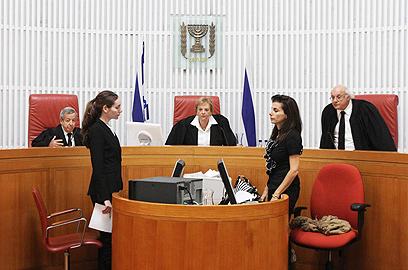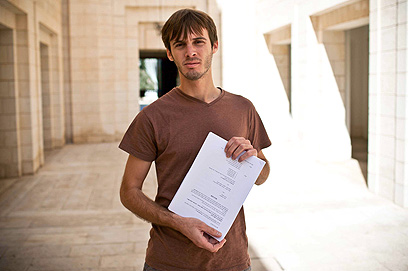Noam Shalit Faces Bereaved Families at High Court
As he entered building, Noam Shalit greeted with harsh responses from members of bereaved families. High Court deliberating on four petitions filed against Shalit deal; Shalit family says failure could result in ‘horrible price to point of no return’. State: There is no reason for court to intervene
Ynet
2011-10-17
Gilad Shalit’s father, Noam, arrived at the Supreme Court in Jerusalem on Monday morning for a High Court of Justice deliberation of four petitions filed against the prisoner exchange deal to secure his son’s release.
As he entered the building, Shalit was greeted with harsh responses from members of bereaved families whose loved ones’ murderers are about to be released from Israel’s prison as part of the deal.
Shalit submitted to court his response to the petitions. The State Prosecutor’s Office said in its own response that there was no room for the court’s intervention in the implementation of the deal.

Noam Shalit in court on Monday (Photo: Ohad Zwigenberg)
Shvuel Schijveschuurder, whose parents and three siblings were killed in a bombing at the Sbarro restaurant in Jerusalem, approached Noam Shalit at the start of the emotionally charged discussion and told him, “Your son will come home and say, ‘Hello father, hello mother,’ and then we’ll experience the biggest terror attack ever seen here.
“Look us in the eyes,” the orphan added. “Put a black ribbon over the flag you placed on your house in Mitzpe Hila. This is a day of mourning.”

Shvuel Schijveschuurder in court on Monday (Photo: Gil Yohanan)
Yossi Zur, who lost his son Assaf in a terror attack on bus No. 37 in Haifa, said to Shalit, “You shouldn’t have come to this discussion.” He later told reporters that Shalit’s arrival was like “stabbing someone in the back and twisting the knife.”
Zur added, “We came to this hearing to ask the judges to save us and cancel this immoral deal. The government’s decision is insane.”

Bereaved families march to High Court on Monday (Photo: Ohad Zwigenberg)
Other bereaved parents told Shalit they had nothing against him. Ze’ev Rapp, whose daughter Helena was stabbed to death by a Palestinian terrorist in Bat Yam, said: “I just want to know if a prime minister’s promise still holds.”
The kidnapped soldier’s father listened to the reactions, but did not respond.
Rapp added upon entering the courthouse that he was considering returning his identity card to the State in protest of the prisoner exchange.
“I am not against Shalit’s return, I am against the release of my daughter’s murderer. I have a written commitment from three prime ministers who promised me that he won’t be released. If this is the country I live in, I’ll draw my conclusions. I am thinking about returning the identity cards and reserve forces certificates of all my family members.”

Ze’ev Rapp and Noam Shalit in court on Monday (Photo: Reuters)
Meir Eindor, head of the Almagor Terror Victims Association, said during the High Court discussion: “Hamas didn’t just kidnap Gilad, it kidnapped the family members, those surrounding them and the entire Israeli society, together with the campaigners who led five years of pressure which brought us to this court today. This is exactly what terror does.”
Eindor added, “We are a civilian front whose job is to ensure that Jewish blood receives the justice the victim under the tombstone is crying out for, what my grandparents cried for on their way to the crematorium. Revenge is justice, justice is judgment, and judgment is ethics.”
In its response to the petitions, the Shalit family expressed “fear that any change in its delicate framework could torpedo the entire deal.” According to the family, “Such a failure could result in a horrible price to a point of no return.”
The family is asking the court to reject the petitions and enable the implementation of the government’s decision. “It is not a deal that was rushed into. It was formulated in long and rigorous negotiations, and was agreed upon by a vast majority of the Israeli government based on lengthy discussions with the relevant officials.”
Aviva Shalit: Every delay risks Gilad’s life (Video: Ido Becker)
The State Prosecutor’s Office also submitted its response to the petitions, claiming that the administrative procedure in approving the deal was conducted properly and that the government’s considerations were relevant, therefore there was no reason for the High Court to intervene in the deal’s implementation.
“Once the deal has been signed it is one piece, so we must take into account that any delay in one of its components means a delay in the entire deal,” the State said in its response.
“There is no basis for the conclusion that international law forbids easing the punishment of these prisoners for political reasons and extraordinary circumstances as we see in this case, when it comes to bargaining required to prevent the ongoing violation of international law – keeping Gilad Shalit in complete isolation and without any contact with the outside world, without allowing Red Cross visits…
“The court has already ruled in the past that political considerations are relevant considerations the authorities may take into account,” the state said.
Addressing the petitioners’ claim that the Shalit deal was in violation of international law, the State used a harsher tone, claiming that it was “far-reaching” and “unfounded”.

Supreme Court President Beinisch presides over court hearing Monday (Photo: Gil Yohanan)
It remains unclear when the court will make its ruling, although it is estimated that the justices will wait until Monday evening to allow the 48-hour timeframe given to submit petitions against the deal to pass.
Senior legal officials estimated on Sunday evening that the High Court would reject the petitions, as was the case in previous prisoner swap deals. “In similar verdicts in the past, such as the one filed two years ago against a Shalit deal, President Beinisch rejected the petition, saying that it was in the government’s discretion and its responsibility,” the officials told Ynet.
They also sought to remind the public that a petition against the deal to return the bodies of IDF soldiers Eldad Regev and Ehud Goldwasser from Lebanon was also rejected by the High Court, which argued that it does not intervene in the government’s decisions pertaining to Israel’s foreign policy and security-related matters.
The sources explained, “Today, petitions with the High Court of Justice serve as a stage for families of terror victims to voice their pain even though the result is well-known in advance.”

Meir Schijveschuurder files his petition to the court (Photo: Noam Moskovich)
The first petition was filed on Friday by the Almagor organization, which represents families of terror victims.
The second petition was filed by surviving members of the Schijveschuurder family, who lost five relatives in a 2001 suicide bombing of a Jerusalem Sbarro branch. They are demanding that the court prevent the release of Ahlam Tamimi, an accomplice who drove the terrorist to the scene of the attack.
The third petition was filed by Ronit Tamari, a resident of Jerusalem, who claims in her petition that the deal is bringing Israel to its knees. She demands that 29 prisoners be removed from the list of released terroists.
On Sunday afternoon, Attorney Ze’ev Dasberg from the judicial institute for terror research, whose sister and brother-in-law Effi and Yaron Unger were murdered in a terror attack near Kfar Menachem in 1996 filed an additional petition, the fourth of its kind against the Shalit deal.